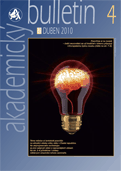A tumour cell, whose mitochondria do not function because of missing mitochondrial DNA, can acquires these functional organelles from another cell, and thus restart cellular respiration and renew its tumour potential. This is a discovery that rewrites textbook science, notes the popularization web portal IFLScience.
An international scientific team under the guidance of prof. Jiří Neužil from the Institute of Biotechnology of the CAS and Griffith University in Australia in cooperation with researchers from the Malaghan Institute in Wellington, New Zealand has discovered that cancer cells deprived of mitochondrial DNA, after being introduced in the receptor (mouse), have the ability to “renew” their mitochondrial DNA by acquiring it from the cells of the host. This leads to the renewal of the mitochondrial function of the mitochondria in cancer cells. The results is that the cells again acquire the ability to create tumours. This fundamental discovery of the function of a cancer cell was published in the prestigious journal Cell Metabolism (see http://www.cell.com/cell-metabolism/abstract/S1550-4131(14)00554-3).
The work indicates several phenomena: the ability of cancer cells to acquire mitochondrial DNA from other cells, likely the intercellular transfer of entire mitochondria, namely in the context of the tumour microenvironment. It further indicates the uncommon plasticity of cancer cells and their ability to overcome adverse conditions. Mitochondria are the energetic centres of cells, in which cellular respiration takes place and the loss of mitochondrial DNA results in the inability of cancer cells to use oxidative phosphorylation for energy production, which in turn limits their growth and malignant properties.
Prof. Ing. Jiří Neužil, CSc.
Prof. Jiří Neužil is head of the Laboratory of Molecular Therapy at the Institute of
Biotechnology of the CAS, v.v.i. His team deals with the biology of cancer cells, especially in
terms of signalling pathways and the mechanism of cell death (apoptosis) induced by compounds
acting on mitochondria (vital cell organelles). With his colleagues, he has defined “mitocans”
(derived from “mitochondria and cancer”) as a group of small molecules which have an anticancer
effect and induce apoptosis by acting on mitochondria. Since mitochondria have recently been shown
to be an important and invariant intervention site for anticancer compounds from the group of
mitocans, these molecules are promising for future practical use.
Prof. Neužil was the first to show that analogues of vitamin E, a represented prototypical
compound of a-tocopheryl succinate (alpha-TOS), have an anti-cancer effect in murine models of
cancer, namely without secondary toxicity. Based on these studies, clinical trials are currently in
preparation for patients with previously untreatable cancer of the pleura (mesothelioma).
Furthermore, it has been possible to identify mitochondrial complex II as a new intervention site
for anticancer agents. Complex II only rarely mutates and therefore seems a promising intervention
site for anti-cancer treatment.
Recently, prof. Neužil’s group managed to synthesize and verify the effectiveness of another
entirely new group of anti-cancer agents acting on mitochondria. These substances are modified by a
triphenylphosphonium group, which leads to their very specific localization in the mitochondria of
cancer cells.
The results so far indicate a high efficiency both in inducing apoptosis in tumour cell lines
and in the suppression of tumour diseases in murine models. For compounds of this type, they are
now in the phase of pre-clinical preparation and clinical tests.
Prof. Neužil works at Griffith University in Australia and also at the Institute of
Biotechnology of the CAS. He leads research groups at both institutions.
contacts: jiri.neuzil@ibt.cas.cz
30 Jan 2015






